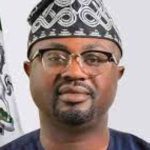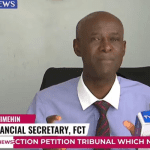The ministry of Education says it is partnering stakeholders in dealing with the data challenges in the sector, as part of a strategy to tackle the many educational challenges in the country.
The educational system in Nigeria has been in a downward decline with each passing decade.
Nigeria is in a constant struggle to meet the United Nations Sustainable Development Goal number four on education.
Poor quality of teaching and the inadequate funding of schools at all levels have been identified as gators mainly responsible for the decline in standards.
Millions of children are still out of school and those in school are not exposed to the minimum teaching standards.
There have been several interventions from both government and donors, but it appears these have not trickled down to the grassroots due to inadequate data for appropriate planning.
Here at this national dialogue on education in Nigeria, the ministry of education agrees that data plays a pivotal role in dealing with challenges in the sector andpledges to partner stakeholders to meet the needs in the sector.
Beyond providing data for adequate planning, stakeholders also talk on the need to improve girls’ education in Nigeria.
It is often said that education for all is the business of all,
Stakeholders must ensure that they play their roles in giving education a priority in the county.
FPI RECTOR WANTS PRESIDENT-ELECT TO INVEST MORE ON POLYTECHNIC EDUCATION UNDER HIS ADMINISTRATION
The President-Elect has been advised to invest more on Polytechnic and technical education in order to build a sustainable nation with job opportunities for the youth and provide solutions to technological problems in society.
The Rector of the Federal Polytechnic Ilaro, Mikhail Akinde made this known during the matriculation of the Institution.
For Nigeria to have a secured future, the country must invest heavily on Polytechnic education and ensure that technical and vocational skills are imparted into the youth
The Rector of the Federal Polytechnic Ilaro made this known at the sideline of the Institution’s matriculation when he advised the President Elect on how to further build a sustainable economy and create job opportunities in the country.
He said with proper funding, the polytechnic sector will provide more skilled manpower, entrepreneurs and employer of labour in the society.
While speaking on poor power supply as another major challenge confronting the growth of Polytechnic education, the Rector said with adequate power supply they will be able to train more young Nigerians on how to fabricate, repair and invent machines that can be of economic benefits to the society.
The newly admitted students were also admonished to acquire knowledge that will help them proffer solutions to some of the challenges confronting the country and to contribute their quota to the development of the country.
The ministry of Education says it is partnering stakeholders in dealing with the data challenges in the sector, as part of a strategy to tackle the many educational challenges in the country.
The educational system in Nigeria has been in a downward decline with each passing decade.
Nigeria is in a constant struggle to meet the United Nations Sustainable Development Goal number four on education.
Poor quality of teaching and the inadequate funding of schools at all levels have been identified as gators mainly responsible for the decline in standards.
Millions of children are still out of school and those in school are not exposed to the minimum teaching standards.
There have been several interventions from both government and donors, but it appears these have not trickled down to the grassroots due to inadequate data for appropriate planning.
Here at this national dialogue on education in Nigeria, the ministry of education agrees that data plays a pivotal role in dealing with challenges in the sector andpledges to partner stakeholders to meet the needs in the sector.
Beyond providing data for adequate planning, stakeholders also talk on the need to improve girls’ education in Nigeria.
It is often said that education for all is the business of all,
Stakeholders must ensure that they play their roles in giving education a priority in the county.
FPI RECTOR WANTS PRESIDENT-ELECT TO INVEST MORE ON POLYTECHNIC EDUCATION UNDER HIS ADMINISTRATION
The President-Elect has been advised to invest more on Polytechnic and technical education in order to build a sustainable nation with job opportunities for the youth and provide solutions to technological problems in society.
The Rector of the Federal Polytechnic Ilaro, Mikhail Akinde made this known during the matriculation of the Institution.
For Nigeria to have a secured future, the country must invest heavily on Polytechnic education and ensure that technical and vocational skills are imparted into the youth
The Rector of the Federal Polytechnic Ilaro made this known at the sideline of the Institution’s matriculation when he advised the President Elect on how to further build a sustainable economy and create job opportunities in the country.
He said with proper funding, the polytechnic sector will provide more skilled manpower, entrepreneurs and employer of labour in the society.
While speaking on poor power supply as another major challenge confronting the growth of Polytechnic education, the Rector said with adequate power supply they will be able to train more young Nigerians on how to fabricate, repair and invent machines that can be of economic benefits to the society.
The newly admitted students were also admonished to acquire knowledge that will help them proffer solutions to some of the challenges confronting the country and to contribute their quota to the development of the country.
The ministry of Education says it is partnering stakeholders in dealing with the data challenges in the sector, as part of a strategy to tackle the many educational challenges in the country.
The educational system in Nigeria has been in a downward decline with each passing decade.
Nigeria is in a constant struggle to meet the United Nations Sustainable Development Goal number four on education.
Poor quality of teaching and the inadequate funding of schools at all levels have been identified as gators mainly responsible for the decline in standards.
Millions of children are still out of school and those in school are not exposed to the minimum teaching standards.
There have been several interventions from both government and donors, but it appears these have not trickled down to the grassroots due to inadequate data for appropriate planning.
Here at this national dialogue on education in Nigeria, the ministry of education agrees that data plays a pivotal role in dealing with challenges in the sector andpledges to partner stakeholders to meet the needs in the sector.
Beyond providing data for adequate planning, stakeholders also talk on the need to improve girls’ education in Nigeria.
It is often said that education for all is the business of all,
Stakeholders must ensure that they play their roles in giving education a priority in the county.
FPI RECTOR WANTS PRESIDENT-ELECT TO INVEST MORE ON POLYTECHNIC EDUCATION UNDER HIS ADMINISTRATION
The President-Elect has been advised to invest more on Polytechnic and technical education in order to build a sustainable nation with job opportunities for the youth and provide solutions to technological problems in society.
The Rector of the Federal Polytechnic Ilaro, Mikhail Akinde made this known during the matriculation of the Institution.
For Nigeria to have a secured future, the country must invest heavily on Polytechnic education and ensure that technical and vocational skills are imparted into the youth
The Rector of the Federal Polytechnic Ilaro made this known at the sideline of the Institution’s matriculation when he advised the President Elect on how to further build a sustainable economy and create job opportunities in the country.
He said with proper funding, the polytechnic sector will provide more skilled manpower, entrepreneurs and employer of labour in the society.
While speaking on poor power supply as another major challenge confronting the growth of Polytechnic education, the Rector said with adequate power supply they will be able to train more young Nigerians on how to fabricate, repair and invent machines that can be of economic benefits to the society.
The newly admitted students were also admonished to acquire knowledge that will help them proffer solutions to some of the challenges confronting the country and to contribute their quota to the development of the country.
The ministry of Education says it is partnering stakeholders in dealing with the data challenges in the sector, as part of a strategy to tackle the many educational challenges in the country.
The educational system in Nigeria has been in a downward decline with each passing decade.
Nigeria is in a constant struggle to meet the United Nations Sustainable Development Goal number four on education.
Poor quality of teaching and the inadequate funding of schools at all levels have been identified as gators mainly responsible for the decline in standards.
Millions of children are still out of school and those in school are not exposed to the minimum teaching standards.
There have been several interventions from both government and donors, but it appears these have not trickled down to the grassroots due to inadequate data for appropriate planning.
Here at this national dialogue on education in Nigeria, the ministry of education agrees that data plays a pivotal role in dealing with challenges in the sector andpledges to partner stakeholders to meet the needs in the sector.
Beyond providing data for adequate planning, stakeholders also talk on the need to improve girls’ education in Nigeria.
It is often said that education for all is the business of all,
Stakeholders must ensure that they play their roles in giving education a priority in the county.
FPI RECTOR WANTS PRESIDENT-ELECT TO INVEST MORE ON POLYTECHNIC EDUCATION UNDER HIS ADMINISTRATION
The President-Elect has been advised to invest more on Polytechnic and technical education in order to build a sustainable nation with job opportunities for the youth and provide solutions to technological problems in society.
The Rector of the Federal Polytechnic Ilaro, Mikhail Akinde made this known during the matriculation of the Institution.
For Nigeria to have a secured future, the country must invest heavily on Polytechnic education and ensure that technical and vocational skills are imparted into the youth
The Rector of the Federal Polytechnic Ilaro made this known at the sideline of the Institution’s matriculation when he advised the President Elect on how to further build a sustainable economy and create job opportunities in the country.
He said with proper funding, the polytechnic sector will provide more skilled manpower, entrepreneurs and employer of labour in the society.
While speaking on poor power supply as another major challenge confronting the growth of Polytechnic education, the Rector said with adequate power supply they will be able to train more young Nigerians on how to fabricate, repair and invent machines that can be of economic benefits to the society.
The newly admitted students were also admonished to acquire knowledge that will help them proffer solutions to some of the challenges confronting the country and to contribute their quota to the development of the country.
The ministry of Education says it is partnering stakeholders in dealing with the data challenges in the sector, as part of a strategy to tackle the many educational challenges in the country.
The educational system in Nigeria has been in a downward decline with each passing decade.
Nigeria is in a constant struggle to meet the United Nations Sustainable Development Goal number four on education.
Poor quality of teaching and the inadequate funding of schools at all levels have been identified as gators mainly responsible for the decline in standards.
Millions of children are still out of school and those in school are not exposed to the minimum teaching standards.
There have been several interventions from both government and donors, but it appears these have not trickled down to the grassroots due to inadequate data for appropriate planning.
Here at this national dialogue on education in Nigeria, the ministry of education agrees that data plays a pivotal role in dealing with challenges in the sector andpledges to partner stakeholders to meet the needs in the sector.
Beyond providing data for adequate planning, stakeholders also talk on the need to improve girls’ education in Nigeria.
It is often said that education for all is the business of all,
Stakeholders must ensure that they play their roles in giving education a priority in the county.
FPI RECTOR WANTS PRESIDENT-ELECT TO INVEST MORE ON POLYTECHNIC EDUCATION UNDER HIS ADMINISTRATION
The President-Elect has been advised to invest more on Polytechnic and technical education in order to build a sustainable nation with job opportunities for the youth and provide solutions to technological problems in society.
The Rector of the Federal Polytechnic Ilaro, Mikhail Akinde made this known during the matriculation of the Institution.
For Nigeria to have a secured future, the country must invest heavily on Polytechnic education and ensure that technical and vocational skills are imparted into the youth
The Rector of the Federal Polytechnic Ilaro made this known at the sideline of the Institution’s matriculation when he advised the President Elect on how to further build a sustainable economy and create job opportunities in the country.
He said with proper funding, the polytechnic sector will provide more skilled manpower, entrepreneurs and employer of labour in the society.
While speaking on poor power supply as another major challenge confronting the growth of Polytechnic education, the Rector said with adequate power supply they will be able to train more young Nigerians on how to fabricate, repair and invent machines that can be of economic benefits to the society.
The newly admitted students were also admonished to acquire knowledge that will help them proffer solutions to some of the challenges confronting the country and to contribute their quota to the development of the country.
The ministry of Education says it is partnering stakeholders in dealing with the data challenges in the sector, as part of a strategy to tackle the many educational challenges in the country.
The educational system in Nigeria has been in a downward decline with each passing decade.
Nigeria is in a constant struggle to meet the United Nations Sustainable Development Goal number four on education.
Poor quality of teaching and the inadequate funding of schools at all levels have been identified as gators mainly responsible for the decline in standards.
Millions of children are still out of school and those in school are not exposed to the minimum teaching standards.
There have been several interventions from both government and donors, but it appears these have not trickled down to the grassroots due to inadequate data for appropriate planning.
Here at this national dialogue on education in Nigeria, the ministry of education agrees that data plays a pivotal role in dealing with challenges in the sector andpledges to partner stakeholders to meet the needs in the sector.
Beyond providing data for adequate planning, stakeholders also talk on the need to improve girls’ education in Nigeria.
It is often said that education for all is the business of all,
Stakeholders must ensure that they play their roles in giving education a priority in the county.
FPI RECTOR WANTS PRESIDENT-ELECT TO INVEST MORE ON POLYTECHNIC EDUCATION UNDER HIS ADMINISTRATION
The President-Elect has been advised to invest more on Polytechnic and technical education in order to build a sustainable nation with job opportunities for the youth and provide solutions to technological problems in society.
The Rector of the Federal Polytechnic Ilaro, Mikhail Akinde made this known during the matriculation of the Institution.
For Nigeria to have a secured future, the country must invest heavily on Polytechnic education and ensure that technical and vocational skills are imparted into the youth
The Rector of the Federal Polytechnic Ilaro made this known at the sideline of the Institution’s matriculation when he advised the President Elect on how to further build a sustainable economy and create job opportunities in the country.
He said with proper funding, the polytechnic sector will provide more skilled manpower, entrepreneurs and employer of labour in the society.
While speaking on poor power supply as another major challenge confronting the growth of Polytechnic education, the Rector said with adequate power supply they will be able to train more young Nigerians on how to fabricate, repair and invent machines that can be of economic benefits to the society.
The newly admitted students were also admonished to acquire knowledge that will help them proffer solutions to some of the challenges confronting the country and to contribute their quota to the development of the country.
The ministry of Education says it is partnering stakeholders in dealing with the data challenges in the sector, as part of a strategy to tackle the many educational challenges in the country.
The educational system in Nigeria has been in a downward decline with each passing decade.
Nigeria is in a constant struggle to meet the United Nations Sustainable Development Goal number four on education.
Poor quality of teaching and the inadequate funding of schools at all levels have been identified as gators mainly responsible for the decline in standards.
Millions of children are still out of school and those in school are not exposed to the minimum teaching standards.
There have been several interventions from both government and donors, but it appears these have not trickled down to the grassroots due to inadequate data for appropriate planning.
Here at this national dialogue on education in Nigeria, the ministry of education agrees that data plays a pivotal role in dealing with challenges in the sector andpledges to partner stakeholders to meet the needs in the sector.
Beyond providing data for adequate planning, stakeholders also talk on the need to improve girls’ education in Nigeria.
It is often said that education for all is the business of all,
Stakeholders must ensure that they play their roles in giving education a priority in the county.
FPI RECTOR WANTS PRESIDENT-ELECT TO INVEST MORE ON POLYTECHNIC EDUCATION UNDER HIS ADMINISTRATION
The President-Elect has been advised to invest more on Polytechnic and technical education in order to build a sustainable nation with job opportunities for the youth and provide solutions to technological problems in society.
The Rector of the Federal Polytechnic Ilaro, Mikhail Akinde made this known during the matriculation of the Institution.
For Nigeria to have a secured future, the country must invest heavily on Polytechnic education and ensure that technical and vocational skills are imparted into the youth
The Rector of the Federal Polytechnic Ilaro made this known at the sideline of the Institution’s matriculation when he advised the President Elect on how to further build a sustainable economy and create job opportunities in the country.
He said with proper funding, the polytechnic sector will provide more skilled manpower, entrepreneurs and employer of labour in the society.
While speaking on poor power supply as another major challenge confronting the growth of Polytechnic education, the Rector said with adequate power supply they will be able to train more young Nigerians on how to fabricate, repair and invent machines that can be of economic benefits to the society.
The newly admitted students were also admonished to acquire knowledge that will help them proffer solutions to some of the challenges confronting the country and to contribute their quota to the development of the country.
The ministry of Education says it is partnering stakeholders in dealing with the data challenges in the sector, as part of a strategy to tackle the many educational challenges in the country.
The educational system in Nigeria has been in a downward decline with each passing decade.
Nigeria is in a constant struggle to meet the United Nations Sustainable Development Goal number four on education.
Poor quality of teaching and the inadequate funding of schools at all levels have been identified as gators mainly responsible for the decline in standards.
Millions of children are still out of school and those in school are not exposed to the minimum teaching standards.
There have been several interventions from both government and donors, but it appears these have not trickled down to the grassroots due to inadequate data for appropriate planning.
Here at this national dialogue on education in Nigeria, the ministry of education agrees that data plays a pivotal role in dealing with challenges in the sector andpledges to partner stakeholders to meet the needs in the sector.
Beyond providing data for adequate planning, stakeholders also talk on the need to improve girls’ education in Nigeria.
It is often said that education for all is the business of all,
Stakeholders must ensure that they play their roles in giving education a priority in the county.
FPI RECTOR WANTS PRESIDENT-ELECT TO INVEST MORE ON POLYTECHNIC EDUCATION UNDER HIS ADMINISTRATION
The President-Elect has been advised to invest more on Polytechnic and technical education in order to build a sustainable nation with job opportunities for the youth and provide solutions to technological problems in society.
The Rector of the Federal Polytechnic Ilaro, Mikhail Akinde made this known during the matriculation of the Institution.
For Nigeria to have a secured future, the country must invest heavily on Polytechnic education and ensure that technical and vocational skills are imparted into the youth
The Rector of the Federal Polytechnic Ilaro made this known at the sideline of the Institution’s matriculation when he advised the President Elect on how to further build a sustainable economy and create job opportunities in the country.
He said with proper funding, the polytechnic sector will provide more skilled manpower, entrepreneurs and employer of labour in the society.
While speaking on poor power supply as another major challenge confronting the growth of Polytechnic education, the Rector said with adequate power supply they will be able to train more young Nigerians on how to fabricate, repair and invent machines that can be of economic benefits to the society.
The newly admitted students were also admonished to acquire knowledge that will help them proffer solutions to some of the challenges confronting the country and to contribute their quota to the development of the country.













